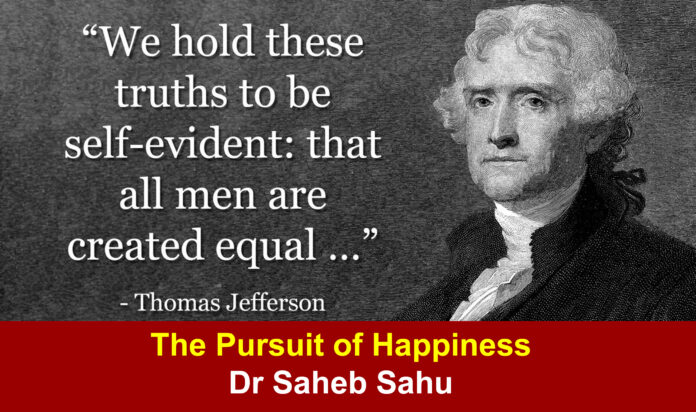Dr Saheb Sahu
“We hold these truths to be self-evident, that all men are created equal, that they are endowed by their creator with certain unalienable Rights that among these are Life, Liberty and pursuit of Happiness”. – The unanimous Declaration of the thirteen united States of America, July 4, 1776.
Thomas Jefferson is credited as the main drafter of the Declaration of Independence, although it was also reviewed and edited by other members of the Continental Congress, including Benjamin Franklin.
How did Jefferson get the phrase “the pursuit of happiness”?
In 1825, writing to the Henry Lee, Jefferson named four authors in particular who influenced him. They were: Aristotle, Cicero, John Locke, and Algernon Sidney. However, legal scholar Jeffrey Rosen believes that Jefferson got it from Cicero’s book Tusculan Disputaions. Cicero (106 BCE-43 CE) was a Roman statesman and philosopher who was influenced by various Greek schools of thought including Stoicism, Epicureanism and Skepticism.
“Today we think of happiness as the pursuit of pleasure. But classical and Enlightenment thinkers defined happiness as the pursuit of virtue- as being good, rather than feeling good. For this reason, founders believed that the quest for happiness is a daily practice, requiring mental and spiritual self-discipline, as well as mindfulness and rigorous time management…. Understood in these terms, happiness is always something to be pursued rather than obtained- a quest rather than a destination’, says Mr. Rosen.
John Adam in his correspondence with Thomas Jefferson at the end of their lives discussed the Hindu Vedas as the possible source of the ancient wisdom regarding happiness. In Adam’s view, the common teachings of the Christians, Greeks, and Jews about happiness could be traced back to Pythagoras, (570-495 BCE ? ), who was said to have encountered them during his travels in Egypt and India.
What are the virtues whose practice will lead to the ‘pursuit of happiness?”
At the age of seventy nine Benjamin Franklin (1706-1790) attributed the “constant felicity of his life” to his daily practice of the classical virtues. Franklin proposed 13 virtues. They are:
1- Temperance
Eat not to dullness, drink not to elevation.
2- Silence
Speak not but what may benefit others or yourself; avoid trifling conversation.
3- Order
Let all your things have their places; let each part of your business have its time.
4 – Resolution
Resolve to perform what you ought to perform without fail what you resolve.
5 – Frugality
Make no expense but to do good to others or yourself; i.e…Waste nothing.
6 – Industry
Lose no time; be always employed in something useful; cut off all unnecessary actions.
7 – Sincerity
Use no hurtful deceit; think innocently and justly; and if you speak, speak accordingly.
8 – Justice
Wrong none by doing injuries or omitting the benefits that are your due.
9 – Moderation
Avoid extremes
10 – Cleanliness
Tolerate no uncleanliness in body, clothes, habitation.
11 – Tranquility
Be not disturbed at trifles, or at accidents common or unavoidable.
12 – Chastity
Rarely use vinery but for health or offspring, never to dullness, weakness, or the injury of your own or another’s peace or reputation.
13 – Humility
Imitate Jesus and Socrates.
Thomas Jefferson’s ( 1743-1826) most systemic attempt to codify his life lessons about industry, virtue, and happiness came in his list of twelve virtues, which he called “cannons of conduct of life”. He sent his list to his granddaughter Cornelia Jefferson Randolph and later shared the list with friends starting in 1817:
1. Never put off tomorrow what you can do today
2. Never trouble another with what you can do yourself
3. Never spend your money before you have it.
4. Never buy a thing you do not want, because it is cheap, it will be dear to you.
5. Take care of your cents; Dollars will take care of themselves!
6. Pride costs us more than hunger, thirst and cold.
7. We never repent of having eaten too little.
8. Nothing is troublesome that one does willingly.
9. How much pain has cost us the evils which never happened!
10.Take thing always by their smooth handle.
11.Think as you please, and so let others, and you will have no disputes.
12. When angry count 10 before you speak; if very angry, 100.
Jefferson includes most of Franklin’s original twelve virtues on his list. Three of them refer to frugality and avoiding needless luxury. Scholars believe that both men were inspired by Cicero’s book Tuscular Disputation.
Conclusion
Now social psychologists are confirming Aristotle’s (384-322 BCE) insight about how emotional self-regulation leads to happiness. Psychologists have confirmed that skills of impulse control, which start to build from infancy, are, in fact, crucial to adult happiness. Eastern philosophies, such as Hinduism, Buddhism and Taoism have emphasized that human emotions are based on ideas. Control of most intense feelings may be achieved by changing one’s ideas.
Before Aristotle, Buddha (C 563 – 483 BCE) prescribed the Middle Path. The Middle Path, or the Noble Eightfold Path, is one of the core teachings of Buddhism, emphasizing moderation and balance in all aspects of life; including avoiding extremes of indulgence or self-mortification. It consists of eight-interconnected factors: right view, right intention, right speech, right action, right livelihood, right effort, right mindfulness, and right concentration. It is seen as a guide to living a life of ethical conduct, mental discipline, and wisdom.
Sources
1 – Jeffery Rosen. The Pursuit of Happiness. How Classical Writers on Virtue Inspired the Lives of the Founders and Defined America .Simon& Schuster, New York: 2024
2 – Wikipedia.org



